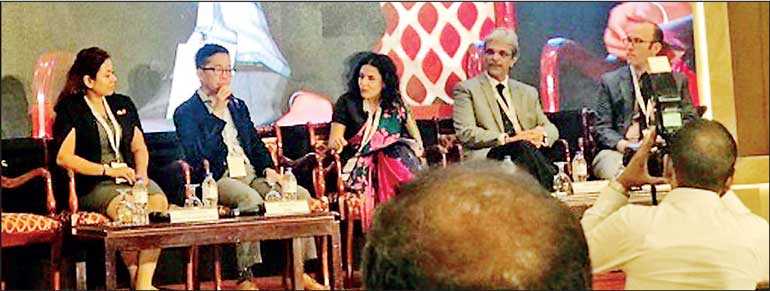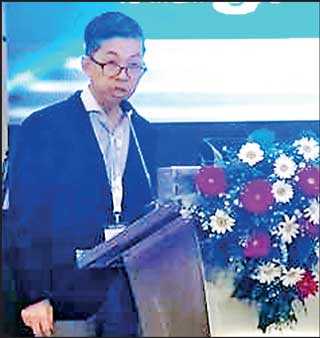Wednesday Feb 18, 2026
Wednesday Feb 18, 2026
Friday, 6 September 2019 00:00 - - {{hitsCtrl.values.hits}}

Sri Lanka being situated in a key location in the East-West Trade route, coupled with India being the neighbour from the North, which is the biggest economy in the sub-continent, has unique advantages to
 |
KPMG Director Lim See Teik presenting at the conference |
Sri Lanka’s logistics industry. Furthermore, the unique location of Sri Lanka along the trade routes and being able to connect the East and the West provides great potential for the country’s development.
Colombo International Logistics Conference Organising Committee Chairman Rohan Masakorala said: “Logistics will play a key role in the development of Sri Lanka and the country is well located to be a distribution hub in the Indian Ocean – although knowledge and skills are key to achieve this hub status along with the right policies.”
Aligning with the conference objectives of identifying opportunities within the logistics industry, a Director in the Strategy and Operations division within KPMG Malaysia’s consulting practice, Lim See Teik presented an overview of the South East Asian logistics industry and its potential for growth at the Colombo International Logistics Conference 2019 held at Hotel Galadari on 1 and 2 August.
In his speech, See Teik compared Southeast Asia, comprising 10 countries including Malaysia, Thailand, Singapore and Vietnam, differs from Sri Lanka in its physical attributes.
A part of Malaysia, for example, is a peninsula in the midst of the Indonesian archipelago. The waters around Malaysia are trade routes between countries of the region as well for those further away.
On the other hand, being an island in the middle of the Indian Ocean, Sri Lanka’s waters are primarily trade routes for connectivity between the larger global economies.
Hence Sri Lanka’s location, adjacent to the massive economy that is India’s, gives rise to additional competitive obstacles unlike those faced in South East Asia. This may be a boon or bane depending on how one chooses to look at it. Whatever the case, Sri Lanka is making dynamic efforts to rise to the occasion to overcome these various challenges.
A key development in the logistics industry is the Belt and Road Initiative (BRI) by China whose strategy is to develop land and sea routes across Asia, Europe, Middle East, and the Americas. From Sri Lanka’s perspective, the two main Chinese investments through the BRI are the Hambantota Port and the Colombo International Financial City. The broader outlook of the BRI would be to enhance greater connectivity by sea and land routes.
The growth of the e-commerce sector is partly dependent upon the maturity of logistics industry. As organisations adopt e-commerce strategies, it is also key to have better development in the logistics industry. The nature of the underlying supply chain may have an impact on consumers who source their needs through e-commerce.
The limited amount of landmass served by the excellent and widespread infrastructure in Singapore enables the speedy delivery of purchases whereas in Thailand or Indonesia, this would take a longer time in comparison due to the land area and level of infrastructure in these countries. Similarly, the relatively compact size of Sri Lanka’s landmass would appear encourage the rise of e-commerce within the country.
“The future is likely to require higher levels of logistics efficiency which may need the adoption of disruptive technologies, the creation of synergies through the sharing of knowledge, leveraging mutual beneficial arrangements with other countries, or a combination of these,” said See Teik.
There is also the need for clear and well managed policies which have been developed by considering the needs of key stakeholders. Clarity in governing policies could help to reduce noncompliance from participants. An active role for governments may be needed to drive the trajectory of the industry’s growth. Regional partnerships between countries, in the form of cooperative initiatives, would encourage closer economic ties to facilitate catering to future demands.
KPMG in Sri Lanka Senior Manager, Advisory Thisara Chathuranga stated: “It was our pleasure to be the knowledge partner of this prestigious conference. As KPMG Sri Lanka Supply Chain Advisory practice, we always try to share the global knowledge and expertise we have in supply chain with the local clients, industries and professionals to prepare them for the future. Over the last five years, we’ve provided Supply Chain Advisory services to different industries in numerous areas such as demand planning, distribution rationalisation and inventory optimisation to have a future proof supply chain. Over the years we’ve established strong relationships with the reputed higher education institutes to support them in developing future supply chain leaders in Sri Lanka,” on a further elaboration on the strategic scope and the future growth potential of the industry in Sri Lanka.